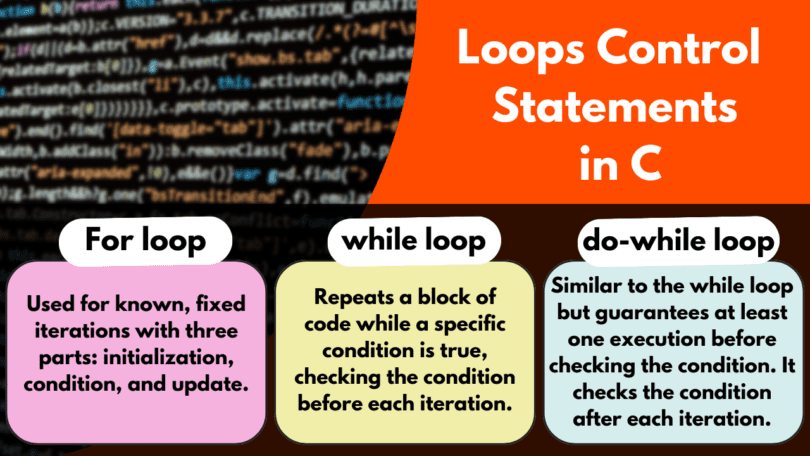Are you looking for Loops Control Statements? well Loop control statements are an essential part of any programming language, and C is no exception. These statements allow you to control the flow of your program by repeating a set of instructions as long as a certain condition is met. In this article, we will explore the various loop control statements available in C, namely for, while, and do-while loops, and learn how to use them effectively in your programs.
Types of Loops in C:
forloopwhileloopdo-whileloop
What is a loop in C?
In C, a loop is a programming mechanism that enables you to repeatedly execute a set of instructions as long as a specific condition remains true. This capability is valuable for automating repetitive tasks, processing data iteratively, and efficiently managing code execution. C provides three primary types of loops: for, while, and do-while, each designed for distinct use cases but all intended to facilitate repetitive actions.
Types of loops and its Description:
| Loop Type | Description |
|---|---|
for loop |
Used for known, fixed iterations with three parts: initialization, condition, and update. |
while loop |
Repeats a block of code while a specific condition is true, checking the condition before each iteration. |
do-while loop |
Similar to the while loop but guarantees at least one execution before checking the condition. It checks the condition after each iteration. |
Use of Loops Control Statements in C:
In C, loop control statements are used to modify the way that loops like for, while, and do-while loops operate. They improve the efficiency of your code by controlling when a loop should end or continue. Three primary loop control statements are present:
break statement: It exits the current loop prematurely when a specific condition is met.
if (i == 5) {
break; // Exits the loop when i is 5
}
printf(“%d\n”, i);
}
continue statement: It skips the current iteration of a loop when a certain condition is met and proceeds to the next iteration.
if (i % 2 == 0) {
continue; // Skips even numbers
}
printf(“%d\n”, i);
}
return statement (in a function): It exits a function and any loop inside it when encountered.
for (int i = 1; i <= 10; i++) {
if (i == 5) {
return; // Exits both the loop and the function
}
printf(“%d\n”, i);
}
}








Leave a Comment